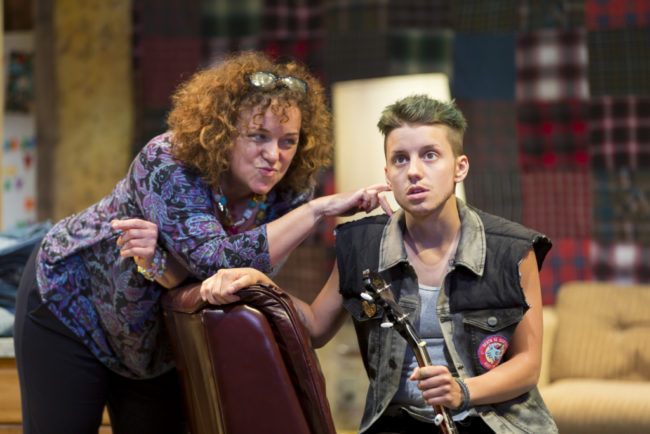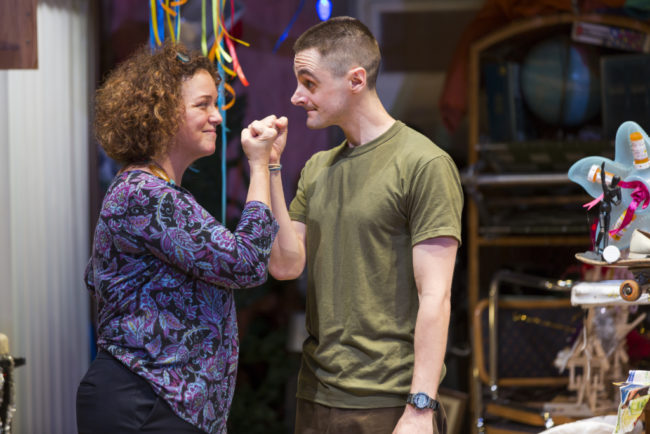We are all proof and conjecture. But proof of what? And conjecture of what? The human condition? Gender non-binary fluidity? Who can say with the plethora of topics being tackled in Obie Award-Winning playwright Taylor Mac’s Hir, now appearing on stage to conclude Woolly Mammoth Theatre Company’s 37th season. Directed by Shana Cooper, this edgy and evocative powder-keg of a conversation starter falls well within the wheelhouse of the sort of productions that the theatre is known for, but ultimately begs the question of: Can you do more harm than good for your cause if you aren’t careful how you handle everything else around your primary subject matter?

Ultimately the production itself is not flawed; the performances are stellar, the design elements exceptionally well aligned with Shana Cooper’s directorial vision. The inherent problem lies in the way Taylor Mac has penned the narrative. There is a beautiful opportunity to address the subject matter of Transgender Identity, Trans*-acceptance practices, Trans* supportive attitudes, and an overall exposure to the LGBTQ+ cultural umbrella, however, Mac systematically destroys these focal points within the play because of the strident strokes of irreverence made when addressing things like soldiers with PTSD, stroke victims, ethical treatment of humans and veterans, domestic violence and abuse, and gender normative identities.
Mac’s immediate offense is in the extremes of judy’s {<lower case sic, per the author’s bio as preferred gender pronoun>} character construct of the characters who do identify within the gender binary. While this is a strong social commentary, presumably designed in exaggeration to make a point, the blunt and blatant point that it ends up making is that those individuals identifying within the gender binary have less of an identity or a right to their identity than those choosing to identify on the “gender alphabet” (a term used in the play.) In addition to this, the brutally dehumanizing treatment of a cis-gendered male character who has suffered a stroke, the blatant mockery of a United States veteran who suffers from PTSD, and the overall abhorrent behavior exhibited and displayed by the cis-gendered maternal female character becomes such a shocking and revolting series of distractions that there is no possible way to focus on any message— positive or negative— that surrounds the Trans* lifestyle and community. Aside from the fact that many may take great offense to such depictions and portrayals, these irreverent behaviors— regardless if they’re meant in satire— are exacerbated to such a heightened level of caricature that they detract from bigger and deeper issues occurring within the play.
Mac’s message regarding Trans* gender does appear to be a positive and supportive one, if you can still locate it amid the rest of the shocking chaos that is occurring. And although not necessarily positive, some of the peripheral issues like the reactions that Isaac— the veteran returning home with PTSD— has to some of his triggers, and the way homeless American veteran soldiers are disregarded by the average US citizen, are boldly addressed as social commentary on the way the country as a society perceives and treats individuals in these instances. The play is not without its well-constructed moments, however; there are tender and honest scenes that cry out to the core of humanity, questioning whether or not anyone is listening. Unfortunately for Mac, the rising tensions and overall direction of the plot is laid out very overtly early on; the question really becomes which character is going to snap and go postal first, with the most obvious choice of the four being the one that actually does.

These constructive criticisms on the playwright’s behalf aside, the production that Woolly Mammoth Theatre Company has composed is something to behold. Set Designer Misha Kachman crafts in ghoulish resplendence a perfect and extraordinarily dysfunctional contained living interior filled to the brim with clutter; the visual whole, not to mention the logistics of it, is overwhelming to take in, looking very much like a posh and glittery episode of Hoarders. Exceptional praise must be given to Production Stage Manager John Keith Hall and the set-team running crew as they transform this living chaos of a set in just 15 minutes over the show’s intermission into something astonishingly and strikingly different. Costume Designer Ivania Stack tethers the show’s absurdist qualities to the insane reality in which these characters live with the sartorial selections featured during the “therapy shadow puppet” scene. The costumes used here simply defy description but are perfectly matched for the calamity that is unfolding in that instance of the show.
Director Shana Cooper drives the tension of Taylor Mac’s work through the discovery and development of relationship dynamics. Pushing the compositional elements of these characters into an almost caricature-like vein, honing in on the extreme quirks of their behaviors, Cooper draws the audiences’ attention to the highly dysfunctional nature of the familial dynamic that Mac has laid down in the work. In addition to Cooper’s prominent highlighting of character dysfunction, there is swift pace to the piece that keeps the audience perpetually unbalanced as each new detail and scenario arises. Robb Hunter, the show’s fight choreographer, assists with this frantic pacing at the show’s climax; this is all that can really be said on the matter without spoiling the climactic moment of the production, however it should be noted that Hunter’s work fits flawlessly into the breakneck build that Cooper has created in racing toward this scene in the second act.

There is no question of strong performances in the production. All four actors, including two Woolly company members Emily Townley and Mitch Hébert, deliver powerful renditions of these characters, falling well within the absurdly psychotic dynamic that Mac has created in the play. Townley in particular, gives a masterful performance as Paige, falling deep into the rabbit hole of slap-happy denial. It’s the harrowing and jarring final moment that her character experiences, which is both blindsiding and beautiful, ultimately making this nauseating and intolerable character palatable and almost pitiable by production’s end. Hébert, as Arnold, is the most physical invested performer on the stage as much of his character is defined by his limitations, which are channeled into his body. The consistency with which he ambles and shuffles about the stage, twitching and responding in kind are difficult to watch but exceptionally in character for what has happened to Arnold.

The raging dynamic between Isaac (Joseph J. Parks) and Max (Malic White) is the more intriguing of the relationships that are explored over the course of the performance. White, whose character is transgender, starts off with a steamrolling sense of moxie and pride; there is an energy which White uses to control the character’s outbursts and internalizations that is both ripe and rearing to go. Parks, whose character is heteronormative and cis-gendered but not without his own set of issues to tackle, has a temper that matches the indefatigable energy that White puts forth in portraying Max. The pair bristle initially, but once they fall into sync with one another, the relationship that they hone— despite their individual struggles in relation to the other characters— is powerful and fascinating.
It is a lot to digest, and well within the wheelhouse of Woolly’s mission statement to “spark a conversation” with the audience, though a certain dose of caution should be taken if only to more readily prepare oneself for everything that will need to be processed after seeing Hir.
Running Time: Approximately 2 hours with one intermission
Hir plays through June 18, 2017 at Woolly Mammoth Theatre Company in the heart of DC’s Penn Quarter neighborhood— 614 D Street NW, Washington DC 20004. For tickets, call the box office at (202) 393-3939 or purchase them online.

